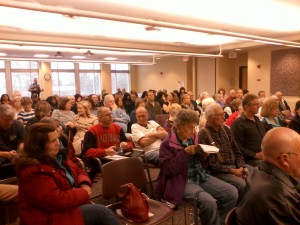Federal lawsuit challenges County Board Fraternite decision
Gregory Harutunian — January 4, 2016
An audience of nearly 160 people attended the April 9 meeting of the county’s Zoning Board of Appeals to hear discussion on a special-use permit. (Photo by Gregory Harutunian/for Chronicle Media)
The Fraternite of Notre Dame Order has filed a federal civil suit seeking to overturn the McHenry County Board’s decision to deny a permit seeking conditional uses and variances.
The board’s determination was termed “discriminatory, arbitrary, and capricious,” and is being fought on the grounds of religious freedom, and violating the Order’s constitutional rights under equal protection of the law.
The civil suit was filed Dec. 16 in the Northern District of Illinois with the initial status hearing slated for Feb. 11 in the Rockford courtroom of Magistrate Judge Iain Johnston, according to the western division’s Office of the Court Clerk.
At issue was the Order’s petition, filed in September 2014, for a permit that would allow construction of a boarding school for boys and girls, an assisted living facility for the elderly with hospice care, a bakery, brewery, winery with sampling room, a larger gift shop, and dormitory for student and staff housing.
The 21-2 County Board decision against the permit and variances considered the matter of industrial uses of natural resources, specifically the septic and well-water systems at the Order’s 10002 Harmony Hill Road property, near Marengo. Board chairman Joe Gottemoller had recused himself from the session, having worked for the Order on its 2005 permit for expanded site operations.
“The Order cannot appeal the decision for the special-use permit, through the county board, but it can be rewritten for submission to the ZBA, or a possible legal remedy as a different use permit,” said Jim Hurley, assistant to the McHenry County administrator, after the decision. “The permit sought allowances for an additional 30 acres that were needed for expanded operations.
“The board did not see this as a religious issue, but a land use issue … and treated it like any other similar petition,” he said. “It was viewed as a commercial development, as opposed to the agricultural zoning designation, which it currently has.”
Following a July 22 hearing, and 4-3 vote, by the McHenry County Zoning Board of Appeals, ZBA member Charles Eldridge, one of the approval votes, had said the permit consideration would advance to the board level regardless. It was considered a neutral decision since a clear majority of votes was required by the ZBA members to make a full recommendation of approval or disapproval.
Attorney Thomas Zanck had represented the Order throughout the petition process, and felt that wastewater and storm water management concerns were generally addressed in the later building permit, or the full site plan, review stage. He indicated that the permit request was to “gain a footprint,” while detractors wanted a fully developed plan.
“It’s very conceivable that I could be called as a witness (in the federal suit) because I’m a local zoning lawyer,” said Zanck. “There were multiple law firms that were interested in handling their case. I recommended that they interview each one, and then, pick one they felt comfortable with.”
The Chicago-based law firm of Burke, Warren, MacKay & Serritella, P.C. drew up the complaint, recorded the filing, and will represent the Order. A copy of the complaint, obtained by the McHenry Chronicle, and filed under docket no. 15-cv-50312, said the French-origin Order established its Chicago Mother House in 2000.
In 2005, it received a special-use permit for a monastery, church, seminary, bakery, retreat center, and cemetery on its 65-acre parcel on the rural outskirts of Marengo. The filing outlines a history of derision by detractors that included “desecrating religious statues of Jesus and Mary,” spray-painting profanities and negative epithets on the property’s perimeters, and damage to mailboxes.
The subsequent contentious series of spring 2015 ZBA hearings were highlighted by testimony from the Order’s representatives, a cadre of nearby residents from the Harmony Hills Estates subdivision, and Coral township officials. An 800-signature counter-petition was also submitted which implicated the Order’s proposal essentially constituted a commercial enterprise in a rural area.
Coral township supervisor Roger Naylor had said the township’s position was to oppose the new permit request, as it did not conform to McHenry County’s unified development ordinance, which was effectuated in October 2014. The suit contends the Order met all the provisional requirements of the code for special uses.
It also cited, under equal protection assertions, that the Order’s site is “located near several nonreligious uses that generate significantly more activity and traffic.” Zoning approval for uses and conditional permits, similar to the Order’s petition, were granted for the Marengo Ridge golf course and pro shop, the county’s Valley-Hi nursing home, and other entities.
Both the Order, and “County of McHenry,” must file their status reports by Feb. 5, prior to the Feb. 11 hearing before Johnston. The presiding judge assigned to the actual civil trial in the Rockford federal court, is Phillip Reinhard.
In response to the civil filing, Hurley said, “At present, the lawsuit is under review by the State’s Attorney’s Office of McHenry County. The McHenry County Board has no comment at this time.”
— Federal lawsuit challenges County Board Fraternite decision —



